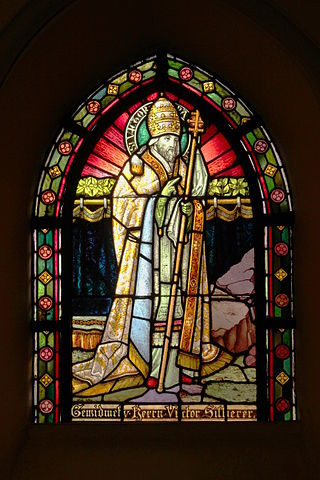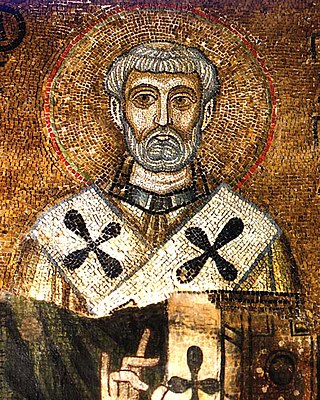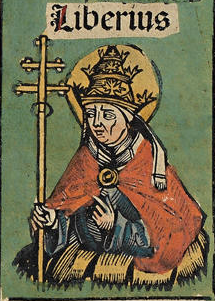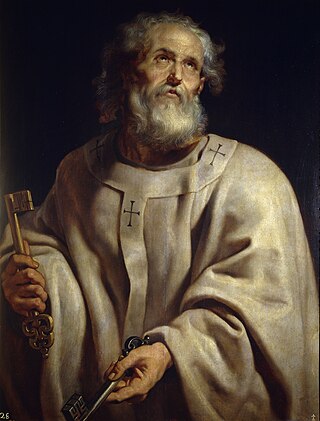
Irenaeus was a Greek bishop noted for his role in guiding and expanding Christian communities in the southern regions of present-day France and, more widely, for the development of Christian theology by combating heterodox or Gnostic interpretations of Scripture as heresy and defining proto-orthodoxy. Originating from Smyrna, he had seen and heard the preaching of Polycarp, who in turn was said to have heard John the Evangelist.

Pope Victor I was a Roman African prelate of the Catholic Church who served as Bishop of Rome in the late second century. The dates of his tenure are uncertain, but one source states he became pope in 189 and gives the year of his death as 199. He was born in the Roman Province of Africa—probably in Leptis Magna. He was later considered a saint. His feast day is celebrated on 28 July as "St Victor I, Pope and Martyr". He was of Berber origin.

Polycarp was a Christian bishop of Smyrna. According to the Martyrdom of Polycarp, he died a martyr, bound and burned at the stake, then stabbed when the fire failed to consume his body. Polycarp is regarded as a saint and Church Father in the Eastern Orthodox Church, Roman Catholic Church, Oriental Orthodox Churches, Lutheranism, and Anglicanism.

Clement of Rome, also known as Pope Clement I, was the bishop of Rome in the late first century AD. He is considered to be the first of the Apostolic Fathers of the Church, and a leading member of the Church in Rome in the late 1st century.

Pope Liberius was the bishop of Rome from 17 May 352 until his death. According to the Catalogus Liberianus, he was consecrated on 22 May as the successor to Julius I. He is not mentioned as a saint in the Roman Martyrology. That makes him the earliest pontiff not to be venerated as a saint in the Catholic Church and, along with Anastasius II, one of only two popes to be omitted from Catholic sainthood in the first 500 years of church history.

Sirmium was a city in the Roman province of Pannonia, located on the Sava river, on the site of modern Sremska Mitrovica in the Vojvodina autonomous province of Serbia. First mentioned in the 4th century BC and originally inhabited by Illyrians and Celts, it was conquered by the Romans in the 1st century BC and subsequently became the capital of the Roman province of Pannonia Inferior. In 293 AD, Sirmium was proclaimed one of the four capitals of the Roman Empire. It was also the capital of the Praetorian prefecture of Illyricum and of Pannonia Secunda. The site is protected as an archaeological Site of Exceptional Importance. The modern region of Syrmia was named after the city.

Vincent of Saragossa, the Protomartyr of Spain, was a deacon of the Church of Saragossa. He is the patron saint of Lisbon, Algarve, and Valencia. His feast day is 22 January in the Catholic Church, Anglican Communion, and the Eastern Orthodox Church, with an additional commemoration on 11 November in the Eastern Orthodox Church. He was born at Huesca and martyred under the Emperor Diocletian around the year 304.

Hosius of Corduba, also known as Hosius the Confessor, Osius or Ossius, was a bishop of Corduba and an important and prominent advocate for Homoousion Christianity in the Arian controversy that divided the early Christianity.

March 24 - Eastern Orthodox liturgical calendar - March 26

March 25 - Eastern Orthodox liturgical calendar - March 27

The seventy disciples, known in the Eastern Christian traditions as the seventy apostles, were early emissaries of Jesus mentioned in the Gospel of Luke. The number of those disciples varies between either 70 or 72 depending on the manuscript.

Saint Anastasia is a Christian saint and martyr who died at Sirmium in the Roman province of Pannonia Secunda. In the Eastern Orthodox Church, she is venerated as St. Anastasia the Pharmakolytria, i.e. "Deliverer from Potions". This epithet is also translated as "One who Cures (Wounds)" in Lampe's A Patristic Greek Lexicon.

August 12 - Eastern Orthodox liturgical calendar - August 14

Saint Victorinus of Pettau was an Early Christian ecclesiastical writer who flourished about 270, and who was martyred during the persecutions of Emperor Diocletian. A Bishop of Poetovio in Pannonia, Victorinus is also known as Victorinus Petavionensis or Poetovionensis. Victorinus composed commentaries on various texts within the Christians' Holy Scriptures.

In Christianity, the Logos is a name or title of Jesus Christ, seen as the pre-existent second person of the Trinity. In the Douay–Rheims, King James, New International, and other versions of the Bible, the first verse of the Gospel of John reads:
In the beginning was the Word, and the Word was with God, and the Word was God.

Benignus of Dijon was a martyr honored as the patron saint and first herald of Christianity of Dijon, Burgundy. His feast falls, with All Saints, on November 1; his name stands under this date in the Martyrology of St. Jerome.

Throughout history, Catholic Mariology has been influenced by a number of saints who have attested to the central role of Mary in God's plan of salvation. The analysis of Early Church Fathers continues to be reflected in modern encyclicals. Irenaeus vigorously defended the title of "Theotokos" or Mother of God. The views of Anthony of Padua, Robert Bellarmine and others supported the doctrine of the Immaculate Conception of the Virgin Mary, which was declared a dogma in 1850.
Stephen Min Kuk-ka was a Korean Roman Catholic saint. He was martyred by strangulation after refusing to deny his faith. His feast day is January 20, and he is also venerated along with the rest of the 103 Korean martyrs on September 20.

Saint Peter, also known as Peter the Apostle, Simon Peter, Simeon, Simon, or Cephas, was one of the Twelve Apostles of Jesus Christ and one of the first leaders of the early Christian Church. He appears repeatedly and prominently in all four New Testament gospels as well as the Acts of the Apostles. Catholic tradition accredits Peter as the first bishop of Rome—or pope—and also as the first bishop of Antioch.
Domnus was the metropolitan bishop of Sirmium early in the fourth century. He probably succeeded Irenaeus, the first known bishop of Sirmium, who was martyred in 304. He was deposed after 325 and before 337. By 343 he was dead.
















